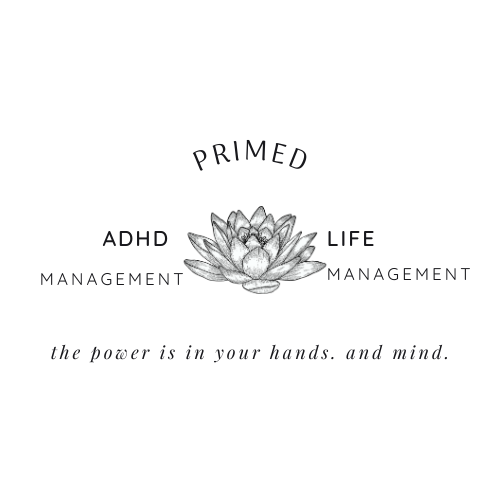ADHD Symptoms
It is estimated that 4.4% of American adults currently have ADHD.
The DSM-IV (The 4th edition of the Diagnostic and Statistical Manual of Mental Disorders) listed three different types of ADHD:
Inattentive type, hyperactive/impulsive type, and combined type.
In 2013, that was changed in DSM-5™ to replace “types” with “presentations”. It acknowledges that ADHD can change during the course of a person’s life.
There are 18 diagnostic criteria. Below are some of the symptoms of ADHD.
Inattention & Distractability
“Attention deficit” doesn’t mean poor attention to all things. It can mean the following:
- Making careless mistakes
- Lacking attention to detail
- Easily distracted by outside stimuli
- Poor follow-through
- Unable to listen to two conversations simultaneously without feeling anxious
- Inability to focus on the task in front of you
- Jumping from activity-to-activity
- Unable to tune out the mind chatter
- Zoning out during a conversation
- You pour your coffee in the morning and it sits nearby getting cold all day because you forget or are too focused on other things to drink it.
- Disorganization
Inattention at work can be perceived as a poor work ethic.
Restlessness/Hyperactivity
- You need to always be moving
- You fidget. You’re always tapping your foot or cracking your joints, or clicking a pen. Something. (Fidgeting is also a way to self-stimulate or self-soothe.)
- You have trouble waiting for your turn to speak in a conversation and often interrupt others. This is also an example of impulsivity.
- Your thoughts race
- Easily bored.
- Road rage
- Running is your activity of choice. You hate yoga or meditation because they’re too slow. You think you can’t meditate because of mind chatter. (Everyone thinks thoughts.)
Impulsivity
Impulsivity is related to patience.
- Impatient
- You interrupt people and butt into conversations (also hyperactivity)
- You blurt out answers before questions have been completed (only beneficial on game shows)
- Road rage
- Starting projects or tasks without thinking them through
- Skipping from task to task because something is “taking too long”
- The “squirrel!” cliche of ADHD.
- Spending money you don’t have without considering the consequences
- Stopping when you don’t see results “too enough”.
Poor Working Memory
Working memory is also known as short-term memory. You use your working memory when you mentally prepare a list before going to the store or think about what you want to accomplish during the day. The following are examples of poor working memory:
- Losing your train of thought mid-sentence (this is also distractability)
- Forgetting what you said a moment ago
- Inability to do tasks without a list
- Difficulty following multi-step directions.
- You get started on something, get distracted, and never remember to go back to it
- You forget where you set down your drink just a moment ago.
Time Blindness
Time blindness basically means losing track of time, a lack of awareness of time.
- You have trouble estimating how long a task will take you and tasks take longer than expected
- You are always running late because you want to do “one more thing” or you think it will take you less time to get somewhere than it does.
- You get sucked into activities and then get lost – be it email, a podcast, a TV show (one more episode!) or browsing a bookstore (just me?). See the downside of hyperfocus.
- You usually think you have more time than you do
- You procrastinate or leave things to the last minute.
Emotional Regulation
- You get overwhelmed by stimuli, sometimes resulting in a meltdown
- Mood swings
- You seem to feel things more intensely than the people around you
- You get frustrated very easily
- You have chronic anxiety
Relationship issues
- Your friends or family think that you’re selfish or self-absorbed
- You seem insensitive, irresponsible, or uncaring
- Your tendency to hyperfocus makes your loved ones feel neglected.
- You forget to check in on people
- Poor communication skills.
Hyperfocus
I believe that hyperfocus is the ADHD person’s superpower. It’s related to time blindness.
Basically, it means that you sit down to do a task, get in the zone and then before you know it, 5 minutes has become two hours and you’re finished your project.
It can also work against you. That 5-minute break can also last two hours, as you go down the rabbit hole of email, web surfing, social media, TV or whatever else you’re doing that isn’t related to what you should be doing.
Harness your hyperfocus superpower with timers.
Other symptoms include
- frequent job loss
- sensitivity to stimuli (scents, sounds, tastes, the feeling of material on your skin)
- inability to think on your feet
- aversion to argument or conflict
- sleep problems
- fatigue from lack of sleep or emotional overwhelm
- Irresponsible with money
I know it’s a lot. I encourage you to seek out more information and testing. I will add some testing resources to this website in the future.
